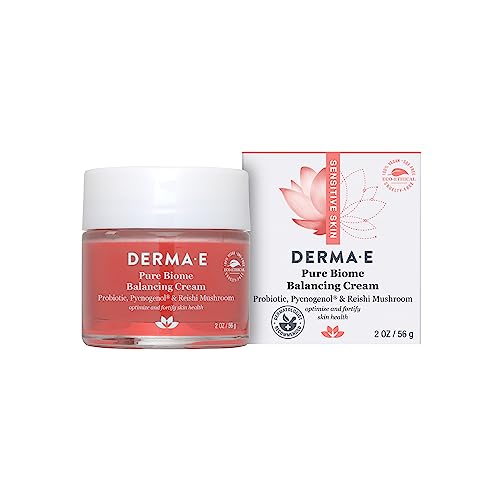
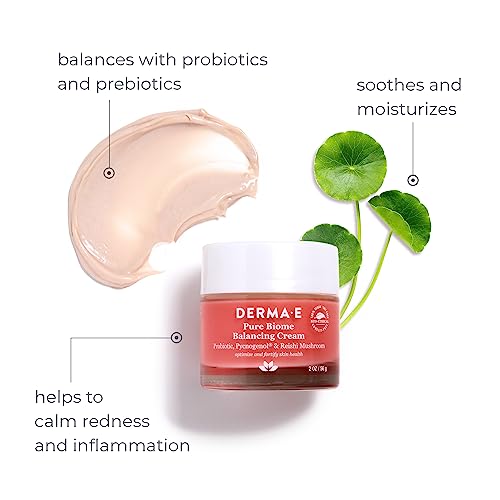
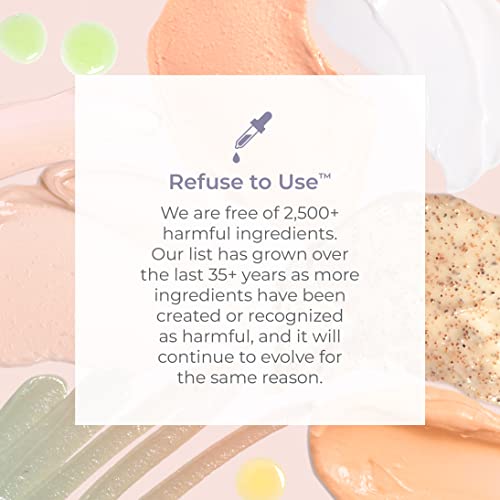
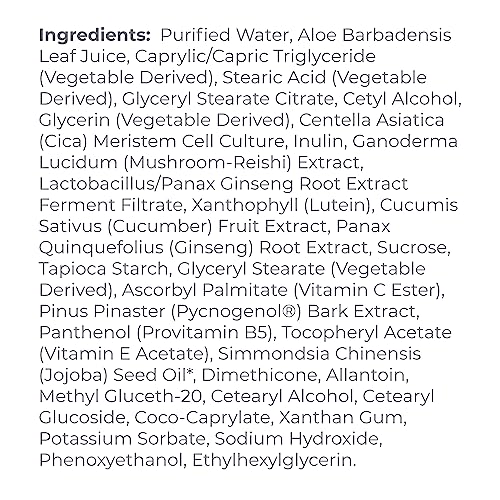
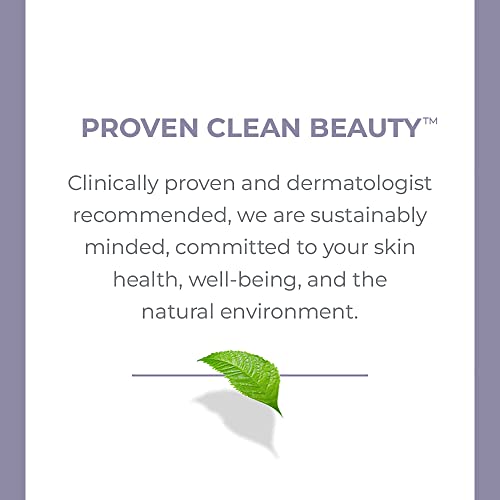

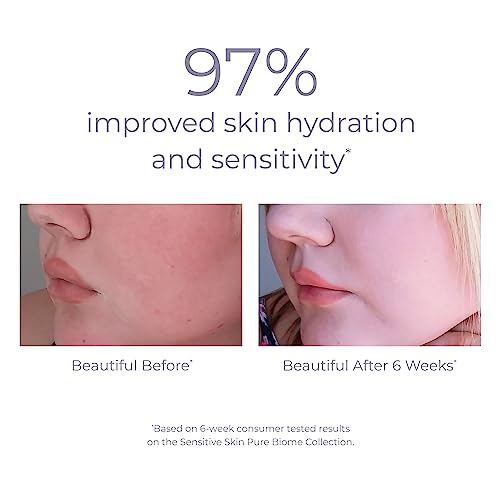
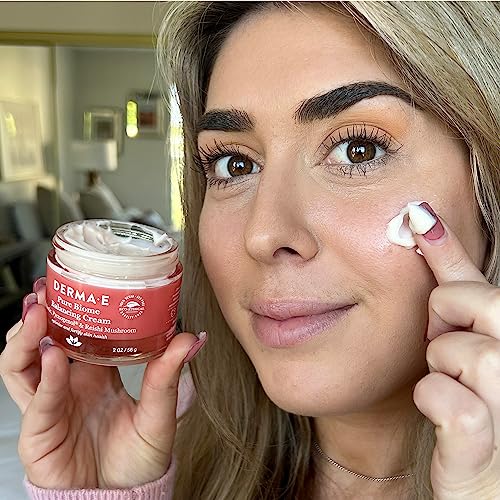
Derma E Moisturizer - Balances Skin Microbiome, Nourishes Sensitive Skin - 2 OZ


Fragrance
High RiskFragrance refers to a mixture of aromatic compounds used in products to provide scent. It is commonly listed as 'fragrance' or 'parfum' on product labels and can serve various functions, including enhancing user experience and masking undesirable odors.
Sustai Insights
Fragrance offers functional benefits by improving product appeal; however, it poses significant health risks, notably a high likelihood of causing allergies and allergic contact dermatitis. Environmental risks include potential pollution and endocrine disruption, though its overall carcinogenicity is low. Regulatory bodies have noted concerns regarding its use, leading to a high-risk classification. Safe usage practices should be observed, and alternatives such as natural essential oils are recommended for those sensitive to synthetic fragrances.
Cetearyl Alcohol
Low RiskCetearyl alcohol is a mixture of cetyl and stearyl alcohol, primarily used as an emulsifier and thickener in cosmetic formulations. It helps stabilize products, improve texture, and enhance moisturizing properties, making it common in creams and lotions.
Sustai Insights
Cetearyl alcohol offers functional benefits as an effective emulsifier and skin-conditioning agent, contributing to product stability and texture. It is generally recognized as safe, with low concerns for carcinogenicity, allergies, or reproductive toxicity. Environmental risks are minimal, as it is biodegradable and has low pollutant potential. Regulatory bodies have not imposed significant restrictions on its use. Overall, cetearyl alcohol is assessed to carry low risk, making it a suitable ingredient choice in cosmetic products.
Vegetarian Glycerin
Low RiskVegetarian glycerin, also known as glycerol, is a colorless, odorless, and viscous liquid derived from plant sources. It is primarily used as a humectant, solvent, and emollient in various personal care products, helping to retain moisture and improve texture.
Sustai Insights
Vegetarian glycerin offers functional benefits as an effective humectant, promoting hydration and skin smoothness. It is biodegradable and typically sustainably sourced. Health risks associated with glycerin are low, with no significant concerns for carcinogenicity, allergens, or reproductive toxicity. Environmental risks are minimal, and it is not subject to major regulatory warnings. Overall, the risk level for this ingredient is low, making it a safe choice in formulations. Safe usage practices include ensuring proper concentrations in products, and alternatives such as propylene glycol exist but may have differing properties.
Butyrospermum Parkii (Shea) Butter
Low RiskButyrospermum parkii (shea) butter is a vegetable fat derived from the nuts of the shea tree. It is commonly used in cosmetic formulations for its emollient properties, providing moisture and improving skin texture. Additionally, shea butter is known for its ability to enhance the stability of products and deliver a creamy texture.
Sustai Insights
Shea butter offers functional benefits as an effective moisturizer, enhancing skin barrier function and texture. It is sustainably sourced and biodegradable, contributing to eco-friendliness. Health-wise, it is associated with low risks for carcinogenicity, allergies, and reproductive toxicity. Environmental impacts are minimal, with no significant pollutant potential identified. Regulatory assessments indicate no current restrictions. Overall, the ingredient presents a low risk, making it a favorable choice in cosmetic formulations.
Simmondsia Chinensis (Jojoba)
Low RiskSimmondsia chinensis, commonly known as jojoba, is an oil derived from the seeds of the jojoba plant. It is commonly used in cosmetic formulations for its moisturizing properties, acting as an emollient and skin conditioning agent.
Sustai Insights
Jojoba oil offers functional benefits such as effective skin moisturization and is biodegradable, with sustainable sourcing practices. Health risks are low, with minimal concerns regarding carcinogenicity, allergies, and reproductive toxicity. Environmental impact is negligible, with no pollutant or bioaccumulation potential. Regulatory status is favorable with no significant restrictions noted. Overall, it is assessed as low risk, and safe usage practices should be maintained. Alternatives include other plant-derived oils like argan or almond oil, which may provide similar benefits.
Water
Low RiskWater is a clear, colorless liquid essential for various biological processes. It serves as a solvent in formulations, facilitating the dissolution of other ingredients and enhancing product texture and application. Additionally, water plays a crucial role in hydration and is a key component in many cosmetic and personal care products.
Sustai Insights
Water is an effective solvent and hydrator, contributing to the texture and efficacy of formulations. It is biodegradable and generally regarded as safe, with low concerns regarding carcinogenicity, allergies, and reproductive toxicity. However, excessive water usage can lead to environmental concerns, particularly regarding resource depletion. Regulatory bodies do not impose restrictions on water use in cosmetics. Overall, the risks associated with water are low, making it a safe and essential ingredient.
Cetearyl Alcohol
Low RiskCetearyl alcohol is a mixture of cetyl and stearyl alcohol, primarily used as an emulsifier and thickener in cosmetic formulations. It helps stabilize products, improve texture, and enhance moisturizing properties, making it common in creams and lotions.
Sustai Insights
Cetearyl alcohol offers functional benefits as an effective emulsifier and skin-conditioning agent, contributing to product stability and texture. It is generally recognized as safe, with low concerns for carcinogenicity, allergies, or reproductive toxicity. Environmental risks are minimal, as it is biodegradable and has low pollutant potential. Regulatory bodies have not imposed significant restrictions on its use. Overall, cetearyl alcohol is assessed to carry low risk, making it a suitable ingredient choice in cosmetic products.
Vegetarian Glycerin
Low RiskVegetarian glycerin, also known as glycerol, is a colorless, odorless, and viscous liquid derived from plant sources. It is primarily used as a humectant, solvent, and emollient in various personal care products, helping to retain moisture and improve texture.
Sustai Insights
Vegetarian glycerin offers functional benefits as an effective humectant, promoting hydration and skin smoothness. It is biodegradable and typically sustainably sourced. Health risks associated with glycerin are low, with no significant concerns for carcinogenicity, allergens, or reproductive toxicity. Environmental risks are minimal, and it is not subject to major regulatory warnings. Overall, the risk level for this ingredient is low, making it a safe choice in formulations. Safe usage practices include ensuring proper concentrations in products, and alternatives such as propylene glycol exist but may have differing properties.
Butyrospermum Parkii (Shea) Butter
Low RiskButyrospermum parkii (shea) butter is a vegetable fat derived from the nuts of the shea tree. It is commonly used in cosmetic formulations for its emollient properties, providing moisture and improving skin texture. Additionally, shea butter is known for its ability to enhance the stability of products and deliver a creamy texture.
Sustai Insights
Shea butter offers functional benefits as an effective moisturizer, enhancing skin barrier function and texture. It is sustainably sourced and biodegradable, contributing to eco-friendliness. Health-wise, it is associated with low risks for carcinogenicity, allergies, and reproductive toxicity. Environmental impacts are minimal, with no significant pollutant potential identified. Regulatory assessments indicate no current restrictions. Overall, the ingredient presents a low risk, making it a favorable choice in cosmetic formulations.
Simmondsia Chinensis (Jojoba)
Low RiskSimmondsia chinensis, commonly known as jojoba, is an oil derived from the seeds of the jojoba plant. It is commonly used in cosmetic formulations for its moisturizing properties, acting as an emollient and skin conditioning agent.
Sustai Insights
Jojoba oil offers functional benefits such as effective skin moisturization and is biodegradable, with sustainable sourcing practices. Health risks are low, with minimal concerns regarding carcinogenicity, allergies, and reproductive toxicity. Environmental impact is negligible, with no pollutant or bioaccumulation potential. Regulatory status is favorable with no significant restrictions noted. Overall, it is assessed as low risk, and safe usage practices should be maintained. Alternatives include other plant-derived oils like argan or almond oil, which may provide similar benefits.
Fragrance
High RiskFragrance refers to a mixture of aromatic compounds used in products to provide scent. It is commonly listed as 'fragrance' or 'parfum' on product labels and can serve various functions, including enhancing user experience and masking undesirable odors.
Sustai Insights
Fragrance offers functional benefits by improving product appeal; however, it poses significant health risks, notably a high likelihood of causing allergies and allergic contact dermatitis. Environmental risks include potential pollution and endocrine disruption, though its overall carcinogenicity is low. Regulatory bodies have noted concerns regarding its use, leading to a high-risk classification. Safe usage practices should be observed, and alternatives such as natural essential oils are recommended for those sensitive to synthetic fragrances.
Water
Low RiskWater is a clear, colorless liquid essential for various biological processes. It serves as a solvent in formulations, facilitating the dissolution of other ingredients and enhancing product texture and application. Additionally, water plays a crucial role in hydration and is a key component in many cosmetic and personal care products.
Sustai Insights
Water is an effective solvent and hydrator, contributing to the texture and efficacy of formulations. It is biodegradable and generally regarded as safe, with low concerns regarding carcinogenicity, allergies, and reproductive toxicity. However, excessive water usage can lead to environmental concerns, particularly regarding resource depletion. Regulatory bodies do not impose restrictions on water use in cosmetics. Overall, the risks associated with water are low, making it a safe and essential ingredient.
Experience the soothing touch of Derma E Pure Biome Balancing Cream, a 2 OZ moisturizer crafted for sensitive skin. This lightweight facial cream balances your skin's microbiome while providing deep hydration, making it ideal for daily use.
- Skin Balancing & Hydration: This proprietary formula nourishes and restores skin health, enhancing moisture levels for a radiant complexion.
- Calming Ingredients: Enriched with Aloe Vera, Vitamin C, and Vitamin E, it comforts reactive skin, minimizing irritation and redness.
- Natural & Effective: Packed with probiotics, Pycnogenol, and Reishi Mushroom, it reduces the appearance of fine lines and promotes youthful skin.
- Daily Use: For optimal results, apply after cleansing, massaging gently into the face and neck for full absorption.
- Eco-Conscious Brand: 100% vegan and cruelty-free, this moisturizer contains no harmful additives, supporting a clean beauty routine that respects the planet.
Subscribe & Save with Sustai
- Best Price Guarantee: Always enjoy the lowest prices on sustainable home essentials.
- No Surprises: We’ll notify you before shipping. No hidden fees, ever.
- You’re in Charge: Change, pause, or cancel your subscription anytime with ease.
- Eco-Friendly Deliveries: Our grouped shipments mean less packaging and lower emissions.
Join us on a sustainable journey. Special offers for a limited time! Prices and promotions may change.
Recommended Products
Experience the soothing touch of Derma E Pure Biome Balancing Cream, a 2 OZ moisturizer crafted for sensitive skin. This lightweight facial cream balances your skin's microbiome while providing deep hydration, making it ideal for daily use.
- Skin Balancing & Hydration: This proprietary formula nourishes and restores skin health, enhancing moisture levels for a radiant complexion.
- Calming Ingredients: Enriched with Aloe Vera, Vitamin C, and Vitamin E, it comforts reactive skin, minimizing irritation and redness.
- Natural & Effective: Packed with probiotics, Pycnogenol, and Reishi Mushroom, it reduces the appearance of fine lines and promotes youthful skin.
- Daily Use: For optimal results, apply after cleansing, massaging gently into the face and neck for full absorption.
- Eco-Conscious Brand: 100% vegan and cruelty-free, this moisturizer contains no harmful additives, supporting a clean beauty routine that respects the planet.

You can have at most 2 Sustainable Steals products in your cart
Customer Reviews
Customers’ View
Customers appreciate the lightweight and creamy texture of the Face Moisturizer, noting that it absorbs quickly without leaving a greasy residue. Many find it soothing, with a pleasant scent that adds to the overall experience. However, there are mixed reviews regarding hydration; some users feel it provides adequate moisture, especially under makeup, while others mention their skin feels dry with just this product. Environmentally conscious consumers value the product's 100% vegan and cruelty-free formulation, free from harmful additives like parabens and sulfates. Overall, customers find this moisturizer to be a gentle and effective option that aligns with their health and eco-friendly preferences.
AI-generated from the text of customer reviewsThis product has no reviews yet.




